“Our Story Needs To Be Told.” Grey’s Anatomy star, Sara Ramirez calls out Dustin Lance Black over Bi Erasure in ‘When We Rise’
Grey’s Anatomy star Sara Ramirez called out Dustin Lance Black over erasing bi history in When We Rise.
In a tweet, the out bisexual actor said: ‘Our story needs to be told’.
She also shared a blog post and picture accusing Lance of not including bisexual people in When We Rise.
.@WhenWeRiseABC didn't include #BiHistory & our story needs to be told. #MustRead https://t.co/xaRVHOKrIZ @babn #LaniKaahumanu #bierasure pic.twitter.com/ALOFoywupE
— Sara Ramirez (@SaraRamirez) March 13, 2017
The Milk screenwriter’s acclaimed eight-hour miniseries looks at the beginning of the gay rights movement, and how it grew across the years.
But Ramirez, as well as the two writers whose words she shared, was missing the ‘B’ part of the LGBTI community.
In a blog post for the Bay Area Bisexual Network, Martin Rawlings-Fein said he was waiting for a bisexual leader to be introduced over the course of the series. He said the exclusion of bi people made him realize how the communities ‘have been telling our stories separately for years’.
And Rawlings-Fein also said bi people were often told to shut up ‘because nobody in the gay community wants to hear [their stories]’.
‘Our stories are not convenient, they do not fit into the boxes in which others try to place them,’ he said.
‘The idea of two women in a relationship that is not a lesbian one was too hard for marriage equality to handle, so Lindasusan Ulrich and Emily Drennen were not used in the case against Prop 8 despite their three marriages to each other.’
Ulrich and Drennen are a couple who have been together for 11 years; they married three times.
Ramirez also quoted Lani Ka’ahumanu, a bisexual activist who founded BiPOL, the US’ first feminist bisexual political action group.
‘Yes this LGBT mini-series “WHEN WE RISE” is a big deal AND there is no bisexual representation. The B is missing from this epic LGBT docu-drama,’ she said. ‘When LGBT people rose in San Francisco [and everywhere else], we rose together.’
She said bi people worked ‘shoulder to shoulder’ with many of the gay activists featured in When We Rise, and her criticism was not supposed to take away from anyone’s contribution.
‘This is to point out what might not be noticed in the excitement of watching “When We Rise”,’ she said. ‘Indeed, this is not a zero-sum game, we can honor those depicted in When We Rise, and mourn the poor Bi+ representation.’
Black replied to Ramirez saying: ‘I admire you greatly @SaraRamirez, but this statement is not true. Real bisexual people & bi activists are portrayed in WhenWeRise.’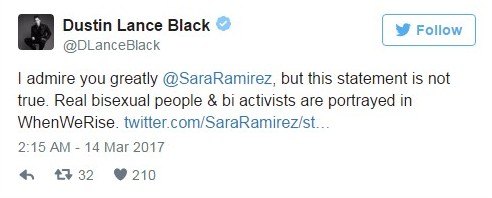
Other bisexual activists soon joined the fray, including BiNet USA, the nation’s oldest bisexual advocacy organization.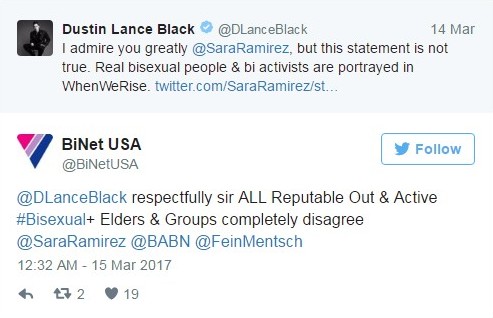
In response, the Oscar-winning scribe suggested “bisexual” didn’t exist as a political identity in the period covered by When We Rise—a statement others were quick to call into question.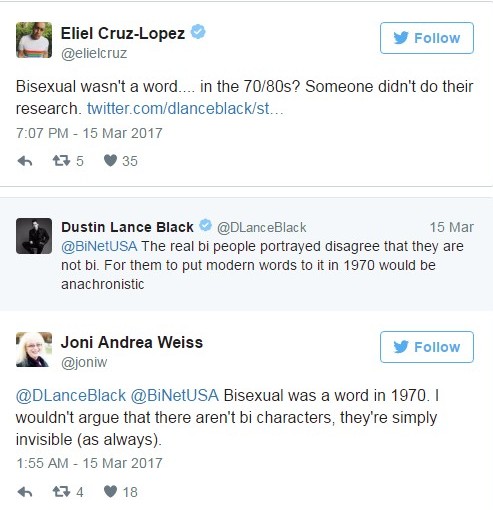
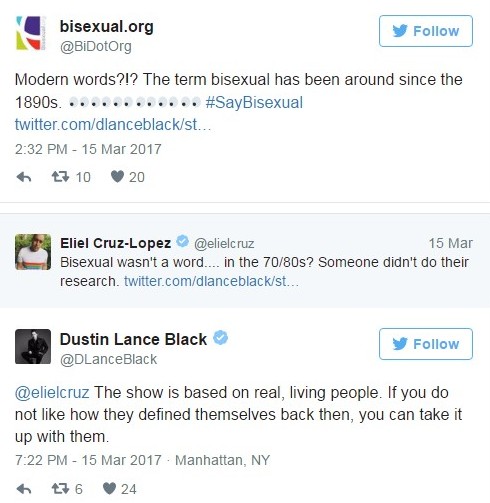
Asked to cite where the bisexual narratives in Rise were, Black instructed critics to “watch the show.”
Writer Eliel Cruz-Lopez critiqued the show’s lack of inclusion on Bisexual.org:
There are two points in the series that are being used as evidence of bi inclusion. In the first two episodes, Ken has a lover that is married to a woman. His lover, Richard, also has HIV and hides his sexuality in part by remaining married to his wife.
The wife acts more as a friend and beard than an actual partner. At one point, when Ken wants to be more out about his sexuality, Richard’s wife says: “Richard and I stayed married for a reason. It’s afforded us this home, our stability. We need more discretion now, Ken, not less.”
This character reads more that he came out to his wife, she reconciled herself to his gayness, and they remained together out of convenience. Not that he is bi.
Black called Cruz-Lopez’s perspective “inaccurate” and questioned if he’d even watched the show.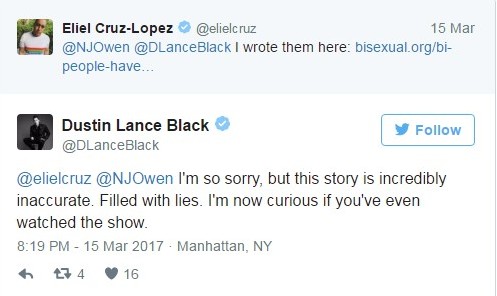
He also claimed allegations that there were no bisexuals in When We Rise were “alternative facts.”
One twitter user pointed out “the word ’bisexual’ was not said once during the series,” before clarifying that she loved Rise, “but wish[ed] bi contributions were more clear.”
Black agreed that bisexuality was worthy of “a deeper dive” and expressed hope “filmmakers will tell that story”—though apparently not him.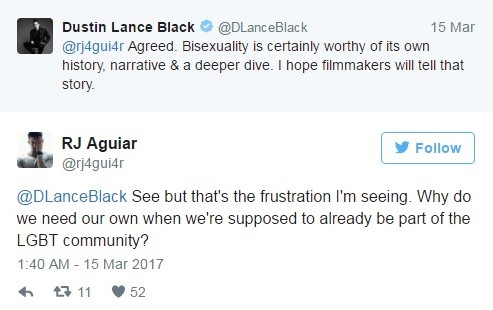
Perhaps more productively, Ramirez tweeted that she respects Black’s perspective and invited him to DM her to set up a meeting. He said he’d be “happy to help work on [a] solution.”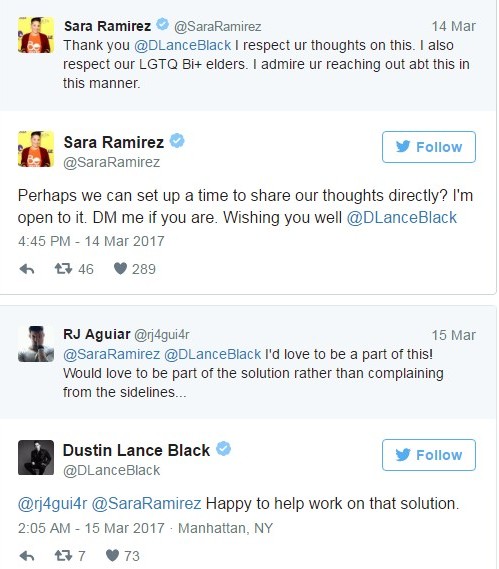
Hey, if all of this leads to a When We Rise: Bisexual Edition, it will officially be the first time something awesome has ever resulted from a Twitter beef.
About author
You might also like
Celebrities Who Have Faced Gay Rumors
IK OgbonnaThe button-handsome actor has had to deny the rumours that he is gay, one time as a guest at the Pulse TV studio, an interview where he turned up
“Why doesn’t he get AIDS?” An antigay evangelist expresses his disapproval of teen gay movie, ‘Love, Simon’
Anti-LGBT evangelical campaigner Peter LaBarbera went to see Love, Simon, and he is not happy. A former Washington Times reporter, LaBarbera is the head of a Christian anti-gay pressure group
The NY Review Of Beyoncé’s ‘Lemonade’
Originally published on newyorker.com Early this month, Beyoncé gave her first extensive interview in nearly three years, appearing on the cover of Elle magazine. Never much of a talker, she

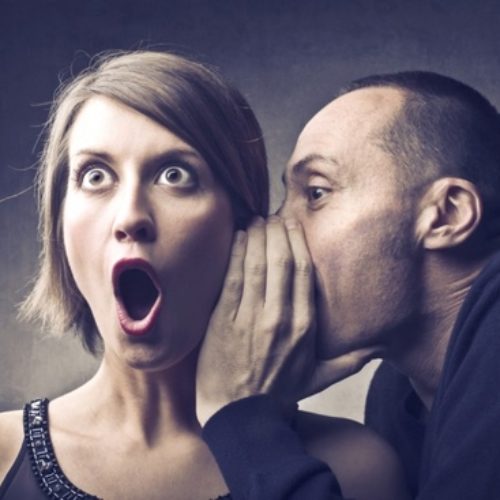
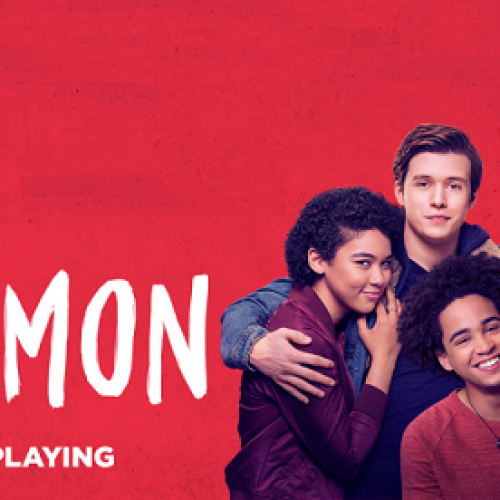
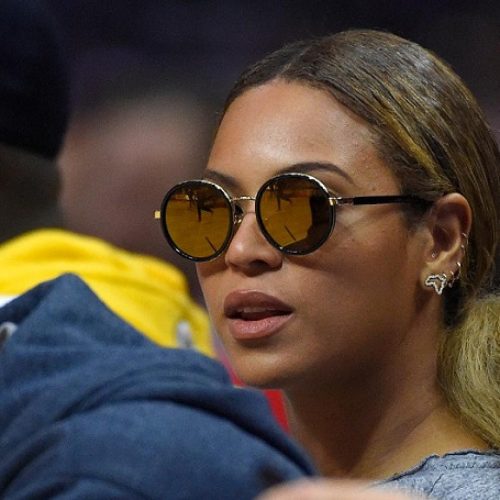






1 Comment
Mandy
March 19, 06:39Dustin Lance Black is doing great work. I like how he’s in Hollywood and with enough power to be championing these LGBT narratives. I thoroughly loved When We Rise, and I’m looking forward to more LGBT series like that.